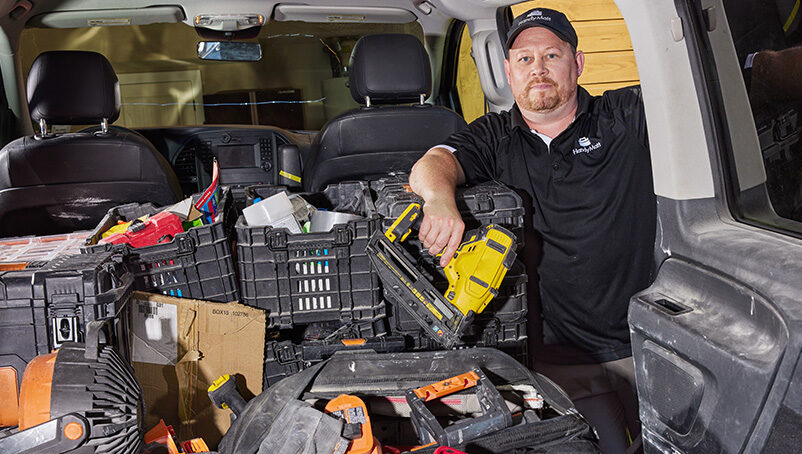Do you need a license to be a general contractor?
There are three different license types recognized in Connecticut:
- Major contractor. A contractor engaged in major construction, structural repair/alteration or demolition projects.
- Home improvement contractor. A contractor who makes a permanent change to a residential property.
- New home construction contractor. A contractor who builds a new single family home prior to occupancy.
Of these options, major contractors are essentially the same as what most people consider general contractors. Major contractors in Connecticut must have a license from the state’s Department of Consumer Protection (DCP).
If your work is limited to the types of projects described for home improvement construction or new home construction contractors, you do not need a license from the state. Instead, you can simply file a contractor registration with the DCP.
How to get a Connecticut general contractor license
To get your major contractor license, you must submit a Connecticut general contractor license application to the DCP’s License Services Division. Be sure to complete the following steps as you fill out the application.
Include reference letters
You must submit five reference letters with your application:
- One credit reference letter from an industry contact, such as a supplier or subcontractor
- One credit reference letter from a financial institution
- Three reference letters from people familiar with your knowledge, skills and abilities as a general contractor
Obtain insurance
You’ll need to submit evidence that you have obtained general liability insurance to cover your work. You can find more information on insurance requirements below.
List current and past work
You must submit information about any projects currently in progress as well as those completed in the past five years. Include details like the name, address, owner and architect or engineer for each project, the contractor amount, and the actual or estimated completion date.
Register your business
You must submit a certificate that proves that you’ve registered your contracting business with the Connecticut Secretary of State. The certificate demonstrating the business’s legal existence must be less than 30 days old.
Have your application notarized
The application includes an affidavit that the applicant and a Notary Public or Justice of the Peace must sign.
Pay the application fee
You must submit a check or money order for $500 with your license application. This payment is nonrefundable and should be made payable to “Treasurer, State of Connecticut.”
General contractor license requirements in Connecticut
There are no education or training requirements to earn a general contractor license. Connecticut’s DCP will consider your professional references and current and past construction projects when reviewing your application, but there are no specific work experience requirements for a major contractor license.
How long does it take to get your general contractor license?
The DCP does not provide estimates on processing times for general contractor license applications. However, they recommend submitting your application through their online portal since online applications are generally processed faster than mailed applications.
Connecticut contractor license renewal requirements
Connecticut major contractor licenses expire on June 30 of each year. The DCP sends renewal notices approximately 30 to 45 days before the expiration date.
The DCP recommends renewing your license online using your user ID and password or the Fast Track Renewal PIN included in the renewal notice. You must pay a $500 license renewal fee each year.
Connecticut general contractor license reciprocity
Connecticut does not maintain general contractor license reciprocity with any other state. However, if your business is registered in another state, but you’re applying for a license to work in Connecticut, you do not need to register in Connecticut.
Instead, you may submit a certificate from your state less than 30 days old demonstrating the business’s legal existence, along with a certificate of good standing from the Connecticut Secretary of State.
What kind of insurance does a general contractor need in Connecticut?
You’ll need to fulfill certain general contractor insurance requirements to get your major contractor license. The following types of business insurance in Connecticut can help cover your work and protect your business.
General Liability insurance
You must submit a certificate of general liability insurance with your major contractor application. This insurance can help provide coverage for a number of potential work-related accidents, like damage to someone’s property or a client injury.
Learn more about general liability for contractors.
Workers’ Compensation insurance
Connecticut workers’ compensation insurance can help provide wage protection and coverage for medical expenses if an employee gets hurt on the job. All Connecticut businesses with one or more employees are required to have this coverage.
Learn more about Workers’ Comp for construction workers.
Tools and Equipment insurance
Because your gear is important to your work, you may want tools and equipment insurance. This coverage may help pay for repairs and replacements if something is stolen or damaged.
Commercial Auto insurance
If you drive to different work sites, you’ll want commercial auto insurance to cover accident-related costs, such as towing, repairs and rental reimbursement.
All vehicles in Connecticut must have minimum auto insurance coverage of $25,000 per person, $50,000 per accident and $25,000 for property damage.
Certificate of insurance requirements
You must submit a certificate of insurance for general contractor liability insurance with your license application. This certificate must list the Department of Consumer Protection as the certificate holder.
How NEXT Insurance supports Connecticut general contractors
NEXT is your go-to resource for general contractor insurance. We’ve helped thousands of contractors across the country get affordable insurance designed to meet their unique needs.
Applying for coverage is simple and easy using our online services. You can compare insurance options, purchase coverage and get a certificate of insurance in just minutes from any computer or mobile device.
Get an instant quote online today.
Are you interested in becoming a general contractor in another U.S. state? Learn what states require general contractor licenses in our summary of general contractor license requirements.
This information has been provided as a service. It is correct and up-to-date to the best of our knowledge; however, it is in no way intended to offer legal advice and you must always consult with local authorities before you make any business decisions. Regulations and requirements may change at any time.






